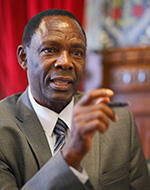
How has your work changed given Covid-19? Do you have a particular role in the Covid-19 response and what does it encompass?
As part of the Covid-19 response, I was appointed to be a member of the Steering Committee for Africa CDC’s Taskforce for Coronavirus (AFCOR) which is chaired by Dr. John Nkengasong, Africa CDC Director. This body was established to be Africa’s lead convener in collaboratively addressing Covid-19 preparedness and response throughout the continent. AFCOR meets weekly to assess and revise the collective Africa strategy for Covid-19 to adapt to changing circumstances, coordinate stakeholders for consensus building to ensure alignment with AFCOR priorities, and oversee working groups to support their troubleshooting of barriers. Additionally, AFCOR promotes coordination of data collection and sharing, serves as a conduit to transmit critical information to key decision makers in member states, and identifies urgent needs for training and other capacity improvements in member states.
What can the malaria community learn from the Covid-19 response? Similarly, are there lessons from malaria that can be integrated into the Covid-19 response?
One good example is Southern Africa Development Community (SADC) Elimination 8 (E8). E8 runs cross border clinics in all 8 countries. These clinics service cross border traders, communities living along the borders, and travelers crisscrossing the countries who are either in search of work or other economic activities. The border clinics do screening for malaria, including among the most vulnerable groups of society. There is an opportunity for covid-19 testing and surveillance to be integrated into the on-going screening in facilities to harness the cross-border initiative infrastructure already in place for malaria. Those who are there can be educated on Covid-19 through the mechanisms already set up for malaria. The staff members charged with conducting Covid-19 screening, can learn from methods being used for malaria in existing health facilities in border areas of E8 member states.
Any other reflections you would like to share?
We are seeing an increase in malaria transmission in Africa with Namibia, Botswana, Zimbabwe, and Southern Mozambique on the borderline of what could be an outbreak. There may be a silent epidemic in Zimbabwe - as of the 4th week of April, 131 people had lost their lives in a malaria outbreak. As many of you know, malaria presents with fever and Covid-19 presents the same way which makes it very challenging for the frontline workers, especially those without adequate PPE.
Additionally, most countries in the region are having issues with malaria commodities. For example, eSwatini is having challenges with RDTs and false positives. Namibia and Zambia have run out of ACTs. The E8 Council of Ministers Chair has issued a warning to other Ministers of Health in the region to continue paying attention to malaria, as they mount successful Covid-19 responses. Given all of this, information sharing has become rather challenging, due to capacity, political and infrastructural problems. Although the rainy season is coming to a close in southern Africa, we have had more than enough rains which will unfortunately extend transmission of malaria. In other parts of the continent, such as west Africa, the rainy season is only just starting representing potential further challenges.
Dr. Richard Nchabi Kamwi - Dr. Richard Kamwi MSc, PhD, has served in the health sector for the last 35 years. He served for 15 years as Deputy Minister and then Minister of Health in Namibia. More recently, he has held key advisory roles at regional and international levels; he is the Africa CDC Champion, a Board Member of the RBM Partnership to End Malaria and a Member of the Independent Advisory Panel of the World Health Organization Regional Director for Africa. Dr. Nchabi Kamwi convened the inaugural Elimination 8 Ministerial Initiative, which was established in 2009 as a platform for regional collaboration towards elimination in the SADC region. He is an expert in the field of malaria elimination and began his career in malaria as the head of the malaria response in Namibia, prior to his appointment as Deputy Minister of Health, and then Minister of Health.
While Minister of Health, he led an effort to secure both domestic and external resources for the health sector, greatly expanding Namibia’s response to HIV, TB, and malaria. Dr. Nchabi Kamwi has demonstrated commitment and leadership for malaria elimination in southern Africa and was requested to continue to support the region as E8 Ambassador after his term in office. As E8 Ambassador, Dr. Nchabi Kamwi supports diplomatic and strategic engagement by the Ministers of Health of SADC. A dedicated health professional and leader, committed to excellence in standards of health service delivery, Nchabi Kamwi has received several awards and recognition such as the Harvard University Leadership Award in Health, Cambridge, the CDC Award of Appreciation for Outstanding Leadership, and the World Health Organization Gold Medal Award. Dr. Kamwi holds a PhD Degree in Malariology from University of Namibia and master’s degree in Applied Parasitology and Medical Entomology from Liverpool School of Tropical Medicine, University of Liverpool, UK.
